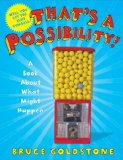
 That's a Possibility
That's a PossibilityA Book About What Might Happen
Review posted July 29, 2013.
Henry Holt and Company, New York, 2013. 32 pages.
Starred Review
2013 Sonderbooks Stand-out: #1 Children's Nonfiction
A book about probability for kids! Hooray! What’s more, I find it tremendously impressive, because Bruce Goldstone keeps things far, far simpler than I could possibly have done if I were trying to write such a book.
Back in my college-math-teaching days, I often taught Introduction to Statistics. That’s probably why it never would have occurred to me that it’s possible to write a book explaining probability without even using fractions. In fact, the only place where he comes close at all is in the explanation about flipping a coin: “So the odds that the coin will land heads up is 1 out of 2 possibilites. (You can also say 50%, because 50 out of 100 is the same as 1 out of 2.)”
He manages to explain every fundamental concept with pictures. The pictures are vibrant, colorful, and interesting – and they so beautifully get across the concepts.
He begins by talking about possibilities. For example, there’s a picture of a kid holding 7 animal-shaped helium balloons. He asks, “If one of these balloons POPS, will it be the monkey? That’s a possibility!”
Then he goes on to talk about when things are impossible. And then what it means to be certain. Then the concepts of “likely,” “probable,” and “improbable.” Those are easily showed with pictures. He uses colorful pictures of flowers, parrots, and gumball machines.
And he goes on beyond the concept of “equally likely outcomes” (which he doesn’t mention, but didn’t I tell you I don’t know how to keep it as simple as he does.) There’s even a page that says, “Your imagination can help you think of possibilities, too.” It shows a girl jumping into a swimming pool, and asks, “What will probably happen when this jumper hits the water?”
Then it goes on to odds and flipping a coin. He explains “independent outcomes” without using those words – the idea that no matter what has already happened, your odds of getting tails on the next toss will always be 1 out of 2.
Then he looks at colorful spinners and a simple game that uses them. Then he looks at the classics of probability theory: playing cards and dice. Instead of listing all the possibilities of a 2-dice roll, he puts pictures of all the possible rolls in a chart, using one white and one black die. Kids can see at a glance that it’s more likely to roll a 7 than any other number.
Then he takes on Combinations and Permutations, again keeping it beautifully simple. Squidgy the Bear has 10 shirts and 10 pairs of pants. We see a picture of all 100 combinations before the author asks us what are the chances he’ll wear one particular outfit.
And the culmination (about permutations), before the notes at the end, is especially fun. Rabbit, Ribbit (a frog), and Robot run in a race. What are the possible results? They’re all pictured for you. I especially like the final questions:
Can you say all the possibilities together without getting your tongue twisted? That’s a possibility, but is it probable?
The notes at the end explain some activities kids can do at home, and then define some terms (like permutations) he didn’t use earlier. This is only very slightly more complex than what went before.
So, what makes me rave about this book? He keeps it so simple! The design is magnificent, and the pictures are beautiful and colorful – and helpful at the same time. But having taught probability to college students, let me tell you, his ability to explain the concepts at an elementary-school level is nothing short of genius. Magnificent!
